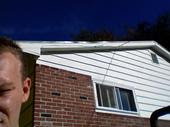
about the Jess show that's at Reed College right now,
"Jess: To and from the Printed Page." I've gone to see it three times. It's big and overwhelming, but also feels frustratingly incomplete—leaving out the big late color collages which are my favorite of Jess's modes. But there's always more to see. The second time I went, I spent most of my time staring at one work, a poster Jess made for some readings Robert Duncan gave in Berkeley in the early seventies. It's divided up into rectangles by blank lines like comic strip "gutters" or window mullions, and as in many comic strips, limbs and other extensions sometimes reach from one frame to another. Each frame is its own distinct composition, but the picture as a whole seems to contain its own single, barely coherent scenic space, with a foreground and a background and a sky and even some seashore, but with perspective going several ways at once (though focused by a kind of church nave in the middle) and scale all wonky. The whole image, like so many in this show, is inexhaustible in its intricacy, overwhelming as a whole; but the many small, interlocking and overlapping images that make it up are each as clear and manageable and inviting and funny as the whole is enigmatic and disorienting: so that, looking, you hop from place to place, back and forth, recognizing, comparing, disentangling, sometimes literally following the path of his penknife, without ever being able to see everything (let alone the EVERYTHING to which it seems, like Duncan's cosmological poetry, to point). The forms of snowflakes and radiolaria turn out to rhyme (a nod to D'Arcy Thompson's
On Growth and Form?), and a cog or wheel which keeps turning up at different angles moonlights as a halo, a pedestal and an orbital schematic.
On the third visit I tried reading through some early text collages. My favorite phrase, from the lower right corner of Boob #3, was:
discover why men like you have mad
PUMPKIN-PATCH GARGOYLE
But there are lots of good ones.
The huge hand-drawn version of
Narkissos takes up one corner, shakily outlined in pencil on white linen, aboil with hard-to-see details. A vitrine holds some of Jess's working notebooks, newspaper clippings and photographs for the work, which also exists as a large black and white collage (above), like a solid body to the drawing's shaky reflection. I wish that the show had included at least a reproduction of the collage, for the sake of comparison.
There's Jess's cover for an issue of Jack Spicer's mimeographed J magazine, with a drawing of a berobed choir singing something from a scroll, framed by a dense background of typed text INJALLJCAPSJWITHJJ'SJINSTEADJOFJSPACESJBETWEENJTHEJWORDS. There's an enormous J taking up the right side of the page: an empty outline which was smeared with glue and then sprinkled with gold glitter. The look of the thing is punk-rock shitty, defiantly gaudy and campily silly all at once—an essential artifact from that strange era of self-publishing.
It's a great show, though I have a few gripes. Two simultaneous audio loops are playing at all times—one of Jess reading his poems, and one of various voices and tunes and noises accompanying the slide-show called Jess's Didactic Nickelodeon—and can both be heard from every part of the room, which is distracting and, in combination with some of the noisier images, becomes so overstimulating that I sometimes found myself plugging my ears with my fingers in order to get a good look at something. And the collages for the second Didactic Nickelodeon series are displayed in a tight grid, many of them so high up the wall that it's impossible to get a good look at them or to read the text that accompanies them. Many books are displayed in vitrines at odd angles such that it's difficult, even when kneeling down, to look closely at them. Naturally one wants to be able to pick them up and flip through them—many are just ordinary perfect-bound paperback and journals from the 80s and 90s, not particularly rare or fragile, and it would have been nice if additional copies had been made available for browsing. This might also have helped to compensate for the show's tendency to refer constantly to poets and poetry without providing much in the way of context or examples, so that non-poets are likely to feel excluded from some secret club, or just ignore the bibliographic element of the show.
Anyway, I'm so grateful to be able to see these works, especially the unphotographable knobbly texture of the "translation" paintings, and the subtle variations of paper and ink color that lend another element to the black and white collages, which in reproduction tend to just look black and white (though that's a nice effect too—easier to see them as seamless whole images that way). It's a very good show, and the Cooley Gallery folks have done a very good thing by bringing it here. I'm looking forward to Steve Dickison's
talk on Jess this Saturday (at 7pm at Reed's Eliot Chapel), which will be proceeded by (wow!) some kind of choral work based on Duncan's
Caesar's Gate by my fellow ex-Olympian, Sarah Dougher.










